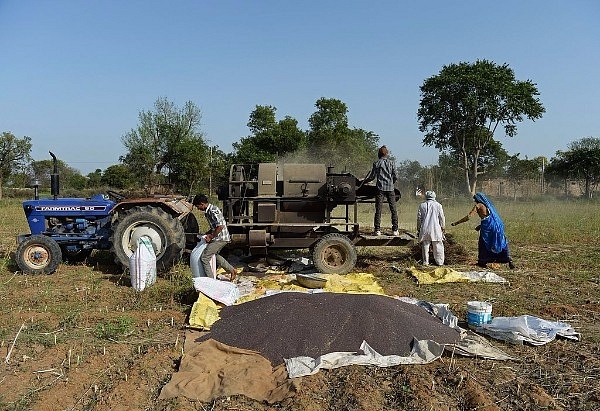Politics
After Seed Industry Split, Agriculture Ministry Should Remember To Do No Harm
- The seed industry recently split into NSAI and FSII due to a conflict over patenting of seeds.
- Both associations are now trying to influence the agri ministry, which itself sowed the seeds of discord through a notification in May.
- The farmer is turning out to be the loser in this battle. The agri ministry must remember to do no harm as it makes its decisions.

Indian farmers process mustard seeds in Alwar district of the western state of Rajasthan. (SAJJAD HUSSAIN/AFP/Getty Images)
At a time when global companies involved in developing novel plant traits and crop protection technologies are merging, the seed industry in India is engaged in a bruising battle. In the last week of August, the National Seed Association of India (NSAI) split, with 10 companies engaged in agri-biotech research forming the Federation of Seed Industry of India (FSII) to champion market pricing of seeds and traits and protection for intellectual property rights. Three of the members quit NSAI while the others have feet in both camps.
The conflict is over patenting. The NSAI says transgenic traits and seeds cannot be patented and cites the 2005 amendment to the Indian Patent Act. The FSII acknowledges that the 2002 amendment to the act did not allow patenting of seeds, varieties and species that have been processed using biotech means, but the 2005 amendment permits patenting of recombinant DNA and protein sequences, say for insect control or herbicide tolerance in plants.
The two associations are trying to influence the agriculture ministry, which sowed the seeds of discord through a notification in May 2016 waiving patents on Bt cottonseed by invoking the Essential Commodities Act. That order said the fee payable by farmers to the developer of traits, like insect-controlling Bt gene, cannot exceed 10 percent of the label price, should be for a maximum of 15 years, declining by 10 percent every year from the sixth year onwards. Since the order upset agri-biotech majors, it was converted into a draft for public consultation. That period ended on 24 August.
The FSII asserts that the longevity of a trait depends on its efficiency and farmers’ willingness to pay; it cannot be arbitrarily fixed. Not all traits are equal. Some are for niche markets, others for wider ones, and so rates must differ. Trait developers cannot also be divested of their right to license the technology to seed companies of their choice. Given that pests can develop resistance to biotech traits if protocols are not observed, those seed companies which are willing to invest in farmers’ education should get preference.
The NSAI agrees that compulsory licenses should not be issued, nor a format for licensing be prescribed. Instead, seed companies as breeders should have access to a trait when its safety to the environment and to human and animal health has been certified by the regulators. The trait fee should be a small percentage of the label price and it should be payable to the National Gene Fund established under the Protection of Plant Varieties and Farmers’ Rights Act, on which the trait developer can make a claim. It says there is no need for a no-objection certificate (NOC) from the regulators for use of an approved trait. Currently, a seed company has to get NOC from the regulators when an agri-biotech trait is inserted into their hybrids.
It is the apprehension that NOC requirement would be waived and its Bt cottonseed with stronger insect resistance grabbed virtually for free that persuaded Maharashtra Hybrid Seed Company (Mahyco) to withdraw its application for regulatory approval of the trait. This trait has become necessary because of the emergence of pink bollworm resistance to the currently most-used version of Bt cottonseed. It also makes cotton plants tolerate a popular weed-killing spray, which farmers are keen on because of the high cost of weeding manually. If the government re-instates its May notification in substance, if not in form, other seed companies might follow and the farmer will be the loser.
The farmer is the loser because of another order of the agriculture ministry – on the pricing of Bt cottonseed. In March 2016, it fixed the price of the version with one insecticidal gene at Rs 635 a pack of 450 grams. Because the Bt gene has gone off patent, there is no trait value to be paid. For the two-gene version which is currently the most used, it fixed the price at Rs 800, including Rs 49 as trait fee. The seed cost should have been Rs 635 plus, say Rs 10, for additional testing and regulatory approval, says C D Mayee, former director of the Central Institute of Cotton Research and founder of the South Asia Biotechnology Centre. But farmers are required to pay Rs 107 more, which is a gain for seed companies. Before price control was clamped nationally, the trait value was about Rs 185. The benefit of the reduction in trait value has been given to seed companies, not farmers.
Decision makers may have their ideological inclinations and prejudices, but it is best to follow the principle incorrectly attributed to the Hippocratic Oath: ‘First, do no harm.’
Introducing ElectionsHQ + 50 Ground Reports Project
The 2024 elections might seem easy to guess, but there are some important questions that shouldn't be missed.
Do freebies still sway voters? Do people prioritise infrastructure when voting? How will Punjab vote?
The answers to these questions provide great insights into where we, as a country, are headed in the years to come.
Swarajya is starting a project with an aim to do 50 solid ground stories and a smart commentary service on WhatsApp, a one-of-a-kind. We'd love your support during this election season.
Click below to contribute.
Latest